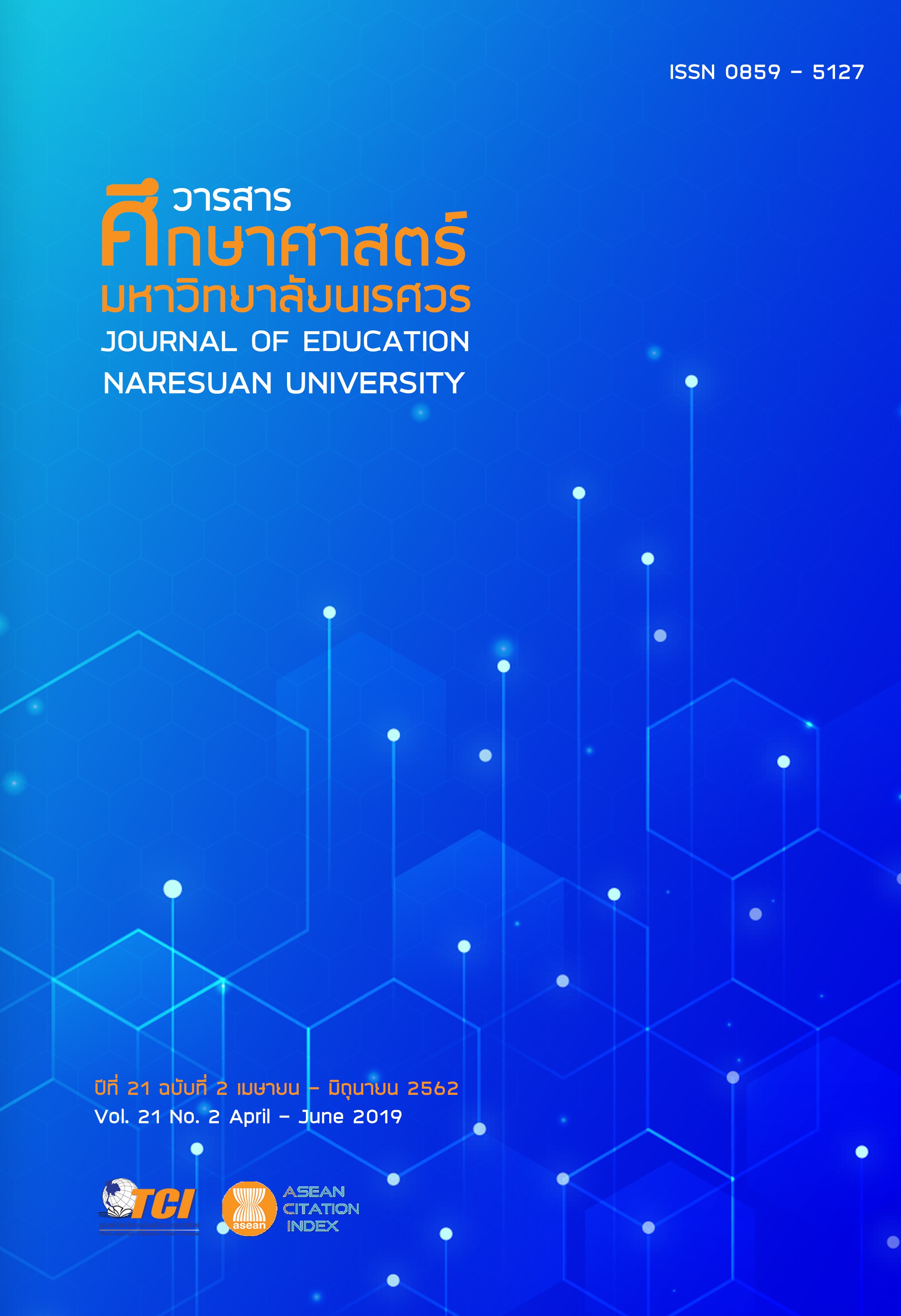การพัฒนาสมรรถนะการอธิบายปรากฏการณ์ในเชิงวิทยาศาสตร์และสมรรถนะการแปลความหมายข้อมูลและประจักษ์พยานในเชิงวิทยาศาสตร์ ของนักเรียนชั้นมัธยมศึกษาปีที่ 4 ด้วยการจัดการเรียนรู้วิทยาศาสตร์โดยการใช้สื่อโฆษณา เรื่อง ระบบย่อยอาหาร (DEVELOPING OF EXPLAIN PHENOMENA SCIENTIFICALLY AND INTERPRET DATA AND EVIDENCE SCIENTIFICALLY COMPETENCIES FOR GRADE 10th STUDENTS THROUGH ADVERTISING AS A LEARNING MANAGEMENT IN TOPIC OF THE DIGESTIVE SYSTEM)
Main Article Content
Abstract
การวิจัยครั้งนี้มีวัตถุประสงค์เพื่อ 1) ศึกษาแนวทางการจัดการเรียนรู้วิทยาศาสตร์โดยการใช้สื่อโฆษณา 2) ศึกษาผลของการพัฒนาสมรรถนะการอธิบายปรากฏการณ์ในเชิงวิทยาศาสตร์และสมรรถนะการแปลความหมายข้อมูลและประจักษ์พยานในเชิงวิทยาศาสตร์ โดยผู้วิจัยเก็บข้อมูลจากนักเรียนชั้นมัธยมศึกษาปีที่ 4 จำนวน 40 คน ปีการศึกษา 2559 เครื่องมือการวิจัย ประกอบด้วย 1) แผนการจัดการเรียนรู้วิทยาศาสตร์โดยการใช้สื่อโฆษณา เรื่อง การย่อยอาหาร 2) แบบสะท้อนการจัดการเรียนรู้ของครู 3) แบบทดสอบสมรรถนะการอธิบายปรากฏการณ์ในเชิงวิทยาศาสตร์และสมรรถนะการแปลความหมายข้อมูลและประจักษ์พยานในเชิงวิทยาศาสตร์ การวิจัยครั้งนี้ใช้หลักการวิจัยเชิงปฏิบัติการ มีการวิเคราะห์ข้อมูลเชิงปริมาณ ผลการวิจัย พบว่า 1) แนวทางการจัดการเรียนรู้วิทยาศาสตร์โดยการใช้สื่อโฆษณาประกอบด้วย การกระตุ้นความรู้เดิมด้วยสื่อโฆษณา การสะท้อนคำโฆษณาที่มีวิทยาศาสตร์และวิทยาศาสตร์เทียมประกอบอยู่ภายในสื่อโฆษณา การนำเข้าสู่ประเด็นการย่อยอาหารโดยใช้ข้อมูลเกี่ยวกับผลิตภัณฑ์ของสื่อโฆษณา การศึกษาเนื้อหา การประเมินความเสี่ยงสื่อโฆษณาผ่านบทบาทสมมติ การประยุกต์ใช้ความรู้สร้างชิ้นงาน การนำเสนอชิ้นงาน และการสะท้อนคิดเพื่อเห็นความคิดที่เปลี่ยนแปลงไปจากการสะท้อนคำโฆษณา 2) ผลของการพัฒนาสมรรถนะการอธิบายปรากฏการณ์ในเชิงวิทยาศาสตร์และสมรรถนะการแปลความหมายข้อมูลและประจักษ์พยานในเชิงวิทยาศาสตร์พบว่าอยู่ที่ระดับ 3 และ 4 ตามลำดับ
DEVELOPING OF EXPLAIN PHENOMENA SCIENTIFICALLY AND INTERPRET DATA AND EVIDENCE SCIENTIFICALLY COMPETENCIES FOR GRADE 10th STUDENTS THROUGH ADVERTISING AS A LEARNING MANAGEMENT IN TOPIC OF THE DIGESTIVE SYSTEM
This research aimed to 1) investigate the learning management by using advertise, and 2) examine the effect of the advertise as a learning management on developing grade 10th students’ on Explain phenomena scientifically competency and Interpret data and evidence scientifically competency in topic of the digestive system. Data was collected from 40 students (36 boys and 4 girls) who studied the biology in 2016 academic year. The research tools comprised 1) three advertise as learning management plans, 2) reflection tool was reflection writing form, and 3) evaluation tools were the digestive system on the explain phenomena scientifically and Interpret data and evidence scientifically competencies tests. This research applied action research. The researcher analyzed quantitative data by calculating means and qualitative data by content analyses. The results revealed that the advertise as learning management on developing grade 10th student’s Explain phenomena scientifically competency and Interpret data and evidence scientifically competency in topic of the digestive system should be as follows: activation of prior knowledge stage by advertise, reflection on advertise that including a science and pseudoscience, using content in advertise to introducing to issue, learning subject matter, risk assessment on advertise, apply knowledge to creation of students’ own products, presenting students’ own products and Mata-reflection. The result of grade 10th student’s Explain phenomena scientifically competency and Interpret data and evidence scientifically competency by using advertise as learning management in topic of the digestive system was on level 3 and 4, respectively.
Article Details
The owner of the article does not copy or violate any of its copyright. If any copyright infringement occurs or prosecution, in any case, the Editorial Board is not involved in all the rights to the owner of the article to be performed.
References
2. Belova, N., Affeldt, F., & Eilks, I. (2016). Using advertising as a teaching and learning medium in the science classroom. School Science Review, 97(361), 86-92.
3. Hodson, D. (2008). In towards scientific literacy: A teacher guide to history, philosophy and sociology of science Rotterdam. The Netherlands: Sense.
4. Faikhamta, C. (2008). Inquiry-based teaching and learning. Journal of Education Naresuan University, 11(1), 33-45. [in Thai]
5. IPST. (2013). Guidebook of physical science. Bangkok: IPST. [in Thai]
6. IPST. (2017). The result of PISA 2015. Bangkok: IPST. [in Thai]
7. Kijkuakul, S. (2013). Nature of science and its learning benchmarks. Journal of Education Naresuan University, 15(2), 137-142. [in Thai]
8. Klainin, S., Dechsri, P., & Pramojnee, A. (2008). PISA 2012 full report. Bangkok: Seven Printing Group. [in Thai]
9. McSharry, G., & Jones, S. (2002). Television programming and advertisements: Help or hindrance to effective science education? International Journal of Science Education, 24(5), 487–497.
10. OECD. (2016). PISA 2015 Results (Volume I) excellence and equity in education. Paris: OECD.
11. Panyo, P. (2016). Exploring eleven-grade students’ understandings of nature of science. Bangkok: Kasetsart University. [in Thai]
12. Rodprapan, P., Thamrongsotthisakul, W., & Vibulrangson, S. (2016). Development of a youth media literacy curriculum based on participation learning for junior secondary school students. Journal of Education Naresuan University, 18(4), 156-170. [in Thai]
13. Samson, V., Grooms, J., & Walker, J. (2009). Argument-driven inquiry. Science Teacher, 76(8), 42-47.
14. Thanaboonsombut, B. (2010). Pseudoscience on GT200. MTEC journals, 59, 51–63. [in Thai]


